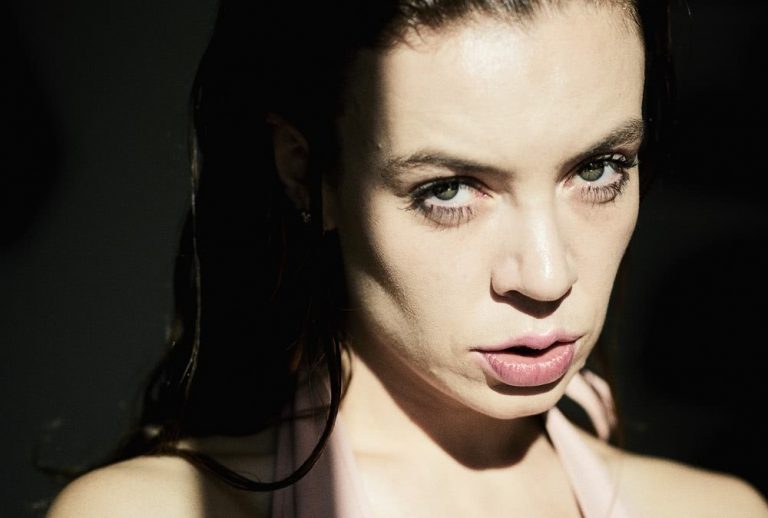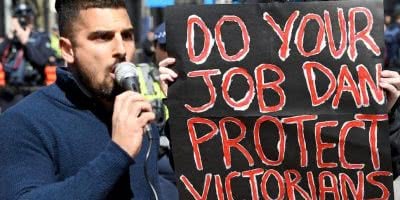Last year, Jessica Says – real name Jessica Venables – went big. Do With Me What U Will, the musician’s second full-length record, was a bright, shining thing; a velvet-drenched mission statement that seemed to draw equal inspiration from confessional literature, ’80s pop, and musical theatre. There had never been anything like it released in this country. Not only had no-one else ever succeeded at what Venables had done, no-one else had even tried. It was that rarest of things: a real original.
Downers, Venables’ forthcoming release, is a different proposition entirely. Rather than trying to replicate the wormy, distinct pleasures of that second record, she has gone smaller; quieter. If Do With Me What U Will was an epic – a musician carefully packing an album full of everything they love, fear, and desire – Downers is a short book of verse. Often armed just with a piano, Venables crunches down entire histories into these succinct, resilient, three-minute fragments. “So I let you go,” her voice swirls on lead single ‘Brand New Thing’, as hard as obsidian. “So I let you go.”
Watch the new Jessica Says single, ‘Brand New Thing’ here:
But although the method might be different, the end result is similar. As was the case with Do With Me What U Will, Downers reaffirms Venables’ status as one of the most important and unique musicians in this country. Her music has the power to change and influence the direction of your life. And all it asks from you is that you listen.
This interview has been edited and condensed for clarity.
The BRAG: You’ve said you wanted to be a director when you were growing up – at what point did those dreams start to shift into wanting to write music?
Jessica Says: I was the sickly type in high school, and spent a lot of time home from school watching movies. At that stage there was a wonderful pink-hued video shop on Smith Street called Video Busters which had a “10 videos for $10” deal and their videos arranged by director. Like many early noughties sad girls, I liked David Lynch, Truffaut and any “controversial French film” – especially [by] Catherine Breillat.
After a few deflating camcorder experiments, I realised film was much more complicated than I ever imagined, so I settled back into my Sylvia Plath and Anne Sexton rip-off teen poetry. At the same time, I’d always played cello, but felt like being in an orchestra was more like being an elite athlete than being an artist and creating something from scratch.
The first Joanna Newsom album came out when I was in year 12 and I was just enamoured – she was writing pop songs with an atypical instrument and her lyrics were exquisite literature. I immediately started trying to write songs and singing into my cassette recorder.
When did you start writing Downers? Did you have an initial vision for the project as a whole from the outset, or did it emerge more organically?
Jessica Says: After so long between my first and second albums, I wanted to make sure I didn’t fall into that trap again of overthinking things. I’d been listening to a lot of EPs, and liked how I tended to listen to the piece as a whole rather than just fixating on the couple of tracks I immediately loved. So, I just decided to try to write the best four songs I can, in sequence.
Watch the video for the Jessica Says song ‘Xanax Baby’ here:
Pop songs have always been about drugs, but illicit drugs tend to be prioritised. When I started writing Downers, I was still working on an adolescent ward, and we encountered paracetamol overdoses every week. Suicide remains the leading cause of death in Australia for 15 to 44-year-olds, and rates continue to increase. This is obviously linked to systemic oppression, welfare cuts, the housing crisis, the privatisation of universities, violence against women and many other aspects of the current climate.
The other songs are more about trying to retain moments of beauty and euphoria in this climate. I wrote ‘Boy Angel’ very quickly after returning from a trip to Seoul, because I didn’t want to lose the person I was at that time and I wanted that sense of wonder to last forever.
How did you first meet Evelyn Morris? How did you know you wanted to collaborate with them?
Jessica Says: Evelyn and I met through Geoffrey O’Connor in 2000. We actually both played our first solo gig together at the Old Bar in 2006. On reflection I’m not sure why they were kind enough to ask me to play that gig, because I was a very obnoxious 19-year old at the time. But I’m extremely grateful that they did, because after that I was asked to play more shows which led to my first album release in 2009.
Last year I was talking to Geoff about wanting to record some piano-based songs and Geoff mentioned that Evelyn was now working at a studio with a grand piano. I knew that they were both highly skilled as a producer and a person that I trusted and admired tremendously.
How long did Downers take to write and record?
Jessica Says: Writing took a little while, mostly because I obsess a lot over lyrics. I was very preoccupied with timelines and productivity when I was younger, but I quickly discovered that as a girl, you’re already considered “old” by the time you’re 25, so why rush when you’re already considered irrelevant? In that way I’ve found ageing quite freeing. I prefer to take a bit longer, in hope that the inevitable cringe factor isn’t quite so bad as time marches on.
Watch the video for the Jessica Says song ‘Fairest Of Them All’ here:
The recording was over two days. It was very beautiful and very simple. I played piano and cello, Evelyn played drums and my dear friend Tracy Chen, who was my housemate at the time, came in to sing some vocals.
Did you approach Downers differently to Do With Me What U Will?
Jessica Says: Song writing wise – no. I always write about the same things. Mental illness, addiction, being a girly girl, lust.
Recording and production wise – very much so. With Do With Me What U Will I wanted to do something “pop” with lots of production, but I just ended up overthinking everything and getting frustrated when I couldn’t make it match my fantasies. I had become quite devoted to K-pop, and when the G-Dragon Kwon Ji Yong EP came out in 2017 and the single was such a beautiful, breathtakingly sparse piano ballad it inspired me to return to very simple instrumentation, which was how my first album We Need To Talk was recorded.
Do you find it challenging juggling work with making music?
Jessica Says: I do. Nursing can be quite consuming, but I try not to neglect my inner adolescent poet because she’s full of idealism and I feel like I need that because working in public mental health in these times can be very sad.
Watch Jessica Says perform Collarbones at Sofar Melbourne here:
That said, I made a terrible full-time musician. I find music festivals very anxiety provoking, and I’m not level headed or disciplined enough to make it work. I got much too caught up in all the junk surrounding the actual music part – wanting evidence that my work means something, backstage passes, being liked by people, Youtube views, thinking about my looks.
How do you judge the success of an album/EP after you drop it?
Jessica Says: I’ve never had any “success” in an external or tangible way, so I try to find my own sense of purpose.
Song-writing is an attempt to exert control in this nightmarish world; to try to purify a feeling or a moment which somehow makes everything else bearable, or processes some of the horrible things. I’m constantly multitasking which means I get very out of touch with my emotions. If a recording can represent some kind of emotional truth, I will feel very happy.
Do you find writing a record lonely?
Jessica Says: I don’t. In the same way you never feel lonely reading a good book. It’s that really yummy, immersive kind of solitude.
Watch the video for the Jessica Says song ‘Rock Candy’ here:
What are you reading/watching at the moment?
Jessica Says: I’m watching Produce 101 China. It’s a survival show where they are making a girl group. It’s totally phenomenal, the standard of the rapping, dance and vocals is extraordinary. I’m reading A Manual For Cleaning Women by Lucia Berlin which was a birthday gift from Geoffrey O’Connor. I’m very very grateful to encounter this book, and you must read it too.
Tell me something you’ve never told an interviewer before.
Jessica Says: In 2008 on my 21st birthday I was in Sydney with Sally Seltmann at the APRA awards at the Hilton. Our job was to play a cover of ‘Straight Lines’ by Silverchair, which ended up winning song of the year. After the ceremony a man in a suit approached us and invited us up to Daniel Johns’ penthouse suite.
I had been a crazy Silverchair fan circa ‘Ana’s Song’ and felt like I was being personally selected to ascend to heaven. It was quite an Almost Famous-type scene with models I recognised, drinks trolleys and everyone smoking inside. Daniel Johns said hi and told me he liked my teeth and placed a Vogue cigarette in the gap. It was all too overwhelming so we left very quickly.
The new EP from Jessica Says, Downers, is out July 6. For more longforms, read our interview with William Basinski here.


































